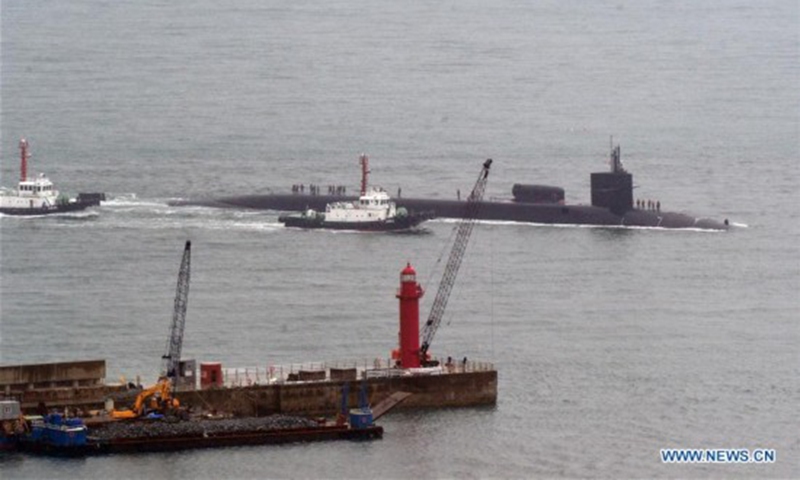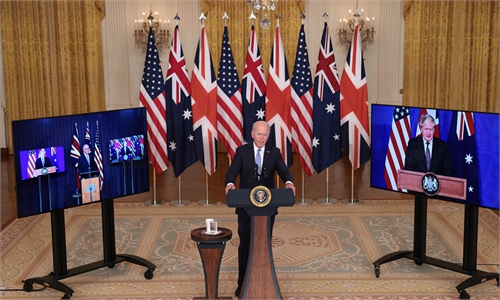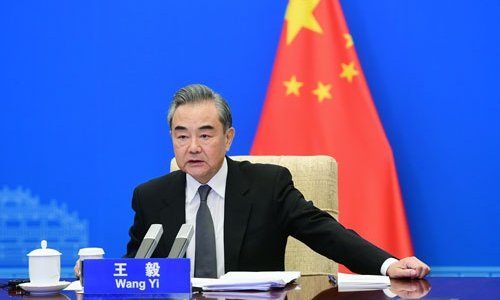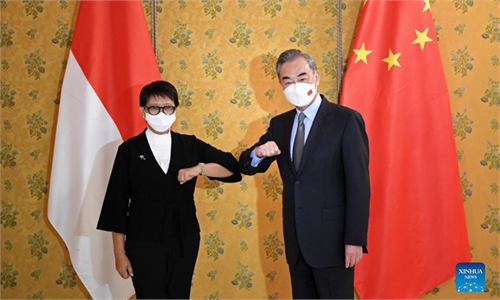
The USS Michigan nuclear-powered submarine arrives at port of Busan, South Korea, April 25, 2017. (Xinhua/NEWSIS)
Russia supported the concerns voiced by China on AUKUS, the new tripartite defense alliance formed with the intention of intimidating China, at a recent meeting of the UN General Assembly's First Committee, saying that they are legitimate concerns as this kind of cooperation is related to the nuclear field and clearly has a military dimension.
More time and information are needed in order to respond properly to the trilateral nuclear cooperation, Russian Deputy Permanent Representative to the UN Office and Other International Organizations in Geneva Andrei Belousov, who represented Russia at recent meetings of the UN General Assembly's First Committee in New York, was quoted as saying in Russian media reports.
"One needs to get full information on the matter to draw conclusions and raise questions about the initiative's possible impact on security and nuclear non-proliferation and figure out if the partnership is in line with the obligations that its members have under various international agreements," Belousov told TASS.
Naturally, Russia has put these questions before the International Atomic Energy Agency in Vienna, we expect to receive answers and support the concerns that our Chinese colleagues have voiced, he pointed out.
He noted that ASEAN countries also expressed serious concerns at the First Committee's session as they viewed AUKUS as a threat to regional security. In particular, the delegations of Indonesia and Malaysia said that the implementation of the initiative might trigger an arms race in the region.
The trilateral partnership announced in September will allow Australia to build at least eight nuclear-powered submarines using US technology. Russian President Vladimir Putin accused AUKUS of undermining regional stability and hoped the nuclear submarine cooperation will not develop in an unprecedented way and create additional problems in the region.
Chinese Foreign Ministry spokesperson Zhao Lijian said on October 14 that the AUKUS nuclear submarine cooperation has created serious nuclear proliferation risks, and clearly violated the spirit of the Treaty on Non-Proliferation of Nuclear Weapons.
He noted that it would not only have a far-reaching impact on the international non-proliferation system, but also bring real threats to regional peace and stability. First, it could create nuclear proliferation risks and impact the international non-proliferation system. Second, it could trigger a new round of arms race, as other countries could follow suit and even cross the nuclear threshold. Third, it could undermine regional prosperity and stability and create regional tensions. Fourth, it could undercut ASEAN countries' efforts to build a Nuclear-Weapon-Free Zone in Southeast Asia. Fifth, it could lead to the resurgence of the cold war mentality, provoke bloc confrontation and zero-sum geopolitical games in the region.
Zhao pointed out that one could easily see that the AUKUS trilateral security partnership was similar to the Quad mechanism in that they both were subordinate to and served the US-led "Indo-Pacific strategy." The US claims to be a champion of "freedom and openness," but in fact it's creating small cliques and military blocs in the region. Such moves ran counter to the trend of the times and won't get any support from regional countries and the international community.
Global Times



